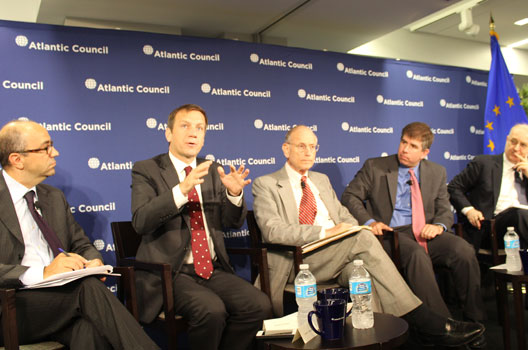 On July 21, the Atlantic Council’s EuroGrowth Initiative hosted a panel of experts to discuss how to bring Europe’s economy back to sustained growth. Andrea Montanino, director of the Atlantic Council’s Global Business & Economics Program, was joined by Gordon Bajnai, former prime minster of Hungary; Stuart Eizenstat, former US ambassador to the European Union (EU) and former deputy secretary of the US Treasury; Jay Shambaugh, member of the Council of Economic Advisers at the White House; and Paul Sheard, chief economist at S&P Global. The conversation focused on a broad range of macroeconomic, microeconomic, and structural reforms. The main takeaways:
On July 21, the Atlantic Council’s EuroGrowth Initiative hosted a panel of experts to discuss how to bring Europe’s economy back to sustained growth. Andrea Montanino, director of the Atlantic Council’s Global Business & Economics Program, was joined by Gordon Bajnai, former prime minster of Hungary; Stuart Eizenstat, former US ambassador to the European Union (EU) and former deputy secretary of the US Treasury; Jay Shambaugh, member of the Council of Economic Advisers at the White House; and Paul Sheard, chief economist at S&P Global. The conversation focused on a broad range of macroeconomic, microeconomic, and structural reforms. The main takeaways:
- Investment levels in Europe remain far below levels in the United States. The funds necessary for start-ups – including hedge funds and venture capital firms – are limited across Europe. This is an economic question that the EuroGrowth Initiative seeks to address.
- Europe does not have a sufficient way to address economic shocks. Neither national governments nor EU-wide institutions are able to engage in macroeconomic stimulus. The absence of fiscal integration is a significant issue for the European Union to address.
- Political as well as economic factors must be considered. Ambassador Eizenstat noted that the founding of the European Union was a highly political decision. Mr. Bajnai discussed the legitimacy of the European project and the necessity for the European Union promote jobs and growth.
- The UK referendum and the high likelihood of Great Britain leaving the European Union is creating a high degree of uncertainty. S&P downgraded the United Kingdom’s (UK) credit rating and the International Monetary Fund reduced the GDP growth projections both in the UK and the rest of Europe. Brexit has increased the necessity for the European Union to promote growth, investment, and stabilization mechanisms.
Image: Andrea Montanino, Gordon Bajnai, Stuart Eizenstat, Jay Shambaugh, and Paul Sheard.
